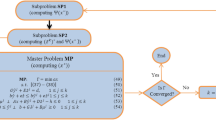Abstract
In this paper, we study the multi-period distributed generation planning problem in a multistage hierarchical distribution network. We first formulate the problem as a non-convex mixed-integer nonlinear programming problem. Since the proposed model is non-convex and generally hard to solve, we convexify the model based on semi-definite programming. Then, we use a customized Benders’ decomposition method with valid cuts to solve the convex relaxation model. Computational results show that the proposed algorithm provides an efficient way to solve the problem for relatively large-scale networks.









Similar content being viewed by others
References
Correia, I., Nickel, S., Saldanha-da Gama, F.: A stochastic multi-period capacitated multiple allocation hub location problem: formulation and inequalities. Omega 74, 122–134 (2018)
Costa, A.M.: A survey on Benders’ decomposition applied to fixed-charge network design problems. Comput. Oper. Res. 32(6), 1429–1450 (2005)
Costa, A.M., França, P.M., Lyra Filho, C.: Two-level network design with intermediate facilities: an application to electrical distribution systems. Omega 39(1), 3–13 (2011)
Cote, G., Laughton, M.A.: Large-scale mixed integer programming: Benders-type heuristics. Eur. J. Oper. Res. 16(3), 327–333 (1984)
Rebennack, S., Pardalos, P.M., Pereira, M.V., Iliadis, N.A.: Handbook of Power Systems I. Springer, Berlin (2010)
Oliveira, C.A., Pardalos, P.M., Resende, M.G.: Optimization problems in multicast tree construction. In: Resende, M.G.C., Pardalos, P.M. (eds.) Handbook of Optimization in Telecommunications, pp. 701–731. Springer (2006)
Da Silva, M.C., França, P.M., Da Silveira, P.D.B.: Long-range planning of power distribution systems: secondary networks. Comput. Electr. Eng. 22(3), 179–191 (1996)
Chiradeja, P.: Benefit of distributed generation: a line loss reduction analysis. In: Transmission and Distribution Conference and Exhibition: Asia and Pacific, 2005 IEEE/PES, pp. 1–5. IEEE (2005)
Griffin, T., Tomsovic, K., Secrest, D., Law, A.: Placement of dispersed generation systems for reduced losses. In: System Sciences, 2000. Proceedings of the 33rd Annual Hawaii International Conference on, pp. 1–9. IEEE (2000)
Nara, K., Hayashi, Y., Ikeda, K., Ashizawa, T.: Application of Tabu search to optimal placement of distributed generators. In: Power Engineering Society Winter Meeting, 2001. IEEE, vol. 2, pp. 918–923. IEEE (2001)
Celli, G., Ghiani, E., Mocci, S., Pilo, F.: A multiobjective evolutionary algorithm for the sizing and sting of distributed generation. IEEE Trans. Power Syst. 20(2), 750–757 (2005)
Glover, J.D., Sarma, M.S., Overbye, T.: Power System Analysis and Design, SI Version. Cengage Learning (2012)
Zhu, J.: Optimization of Power System Operation, vol. 47. Wiley, Hoboken (2015)
Pandya, K., Joshi, S.: A survey of optimal power flow methods. J. Theor. Appl. Inf. Technol. 4(5), 450–458 (2008)
Chen, N., Tan, C.W., Quek, T.Q.: Electric vehicle charging in smart grid: optimality and valley-filling algorithms. IEEE J. Sel. Top. Signal Process. 8(6), 1073–1083 (2014)
Ghasemi, M., Ghavidel, S., Ghanbarian, M.M., Gitizadeh, M.: Multi-objective optimal electric power planning in the power system using gaussian bare-bones imperialist competitive algorithm. Inf. Sci. 294, 286–304 (2015)
Hours, J.H., Jones, C.N.: An alternating trust region algorithm for distributed linearly constrained nonlinear programs, application to the optimal power flow problem. J. Optim. Theory Appl. 173(3), 844–877 (2017)
Lavaei, J., Low, S.H.: Zero duality gap in optimal power flow problem. IEEE Trans. Power Syst. 27(1), 92–107 (2012)
Madani, R., Sojoudi, S., Lavaei, J.: Convex relaxation for optimal power flow problem: mesh networks. IEEE Trans. Power Syst. 30(1), 199–211 (2015)
Sultana, U., Khairuddin, A.B., Aman, M., Mokhtar, A., Zareen, N.: A review of optimum DG placement based on minimization of power losses and voltage stability enhancement of distribution system. Renew. Sustain. Energy Rev. 63, 363–378 (2016)
Tanwar, S.S., Khatod, D.: Techno-economic and environmental approach for optimal placement and sizing of renewable DGs in distribution system. Energy 127, 52–67 (2017)
Davis, P., Ray, T.: A branch-bound algorithm for the capacitated facilities location problem. Nav. Res. Logist. (NRL) 16(3), 331–344 (1969)
Coffrin, C., Hijazi, H.L., Van Hentenryck, P.: Strengthening the SDP relaxation of AC power flows with convex envelopes, bound tightening, and valid inequalities. IEEE Trans. Power Syst. 32(5), 3549–3558 (2017)
Kocuk, B., Dey, S.S., Sun, X.A.: Inexactness of SDP relaxation and valid inequalities for optimal power flow. IEEE Trans. Power Syst. 31(1), 642–651 (2016)
Benders, J.F.: Partitioning procedures for solving mixed-variables programming problems. Numer. Math. 4(1), 238–252 (1962)
Geoffrion, A.M.: Generalized Benders’ decomposition. J. Optim. Theory Appl. 10(4), 237–260 (1972)
Cordeau, J.F., Pasin, F., Solomon, M.M.: An integrated model for logistics network design. Ann. Oper. Res. 144(1), 59–82 (2006)
Cordeau, J.F., Soumis, F., Desrosiers, J.: A Benders’ decomposition approach for the locomotive and car assignment problem. Transp. Sci. 34(2), 133–149 (2000)
Cordeau, J.F., Soumis, F., Desrosiers, J.: Simultaneous assignment of locomotives and cars to passenger trains. Oper. Res. 49(4), 531–548 (2001)
Raayatpanah, M.A., Fathabadi, H.S., Khalaj, B.H., Khodayifar, S.: Minimum cost multiple multicast network coding with quantized rates. Comput. Netw. 57(5), 1113–1123 (2013)
Geoffrion, A.M., Graves, G.W.: Multicommodity distribution system design by Benders’ decomposition. Manag. Sci. 20(5), 822–844 (1974)
Khodayifar, S., Raayatpanah, M., Pardalos, P.: An accelerating Benders decomposition approach to the integrated supply chain network design with distributed generation. Energy Syst. pp. 1-21 (2017). https://doi.org/10.1007/s12667-017-0256-6
Zimmerman, R.D., Murillo-Sánchez, C.E., Thomas, R.J.: Matpower: steady-state operations, planning, and analysis tools for power systems research and education. IEEE Trans. Power Syst. 26(1), 12–19 (2011)
Acknowledgements
The authors are grateful to the editors for their constructive comments, which helped us improve the presentation of this paper substantially.
Author information
Authors and Affiliations
Corresponding author
Rights and permissions
About this article
Cite this article
Khodayifar, S., Raayatpanah, M.A., Rabiee, A. et al. Optimal Long-Term Distributed Generation Planning and Reconfiguration of Distribution Systems: An Accelerating Benders’ Decomposition Approach. J Optim Theory Appl 179, 283–310 (2018). https://doi.org/10.1007/s10957-018-1367-5
Received:
Accepted:
Published:
Issue Date:
DOI: https://doi.org/10.1007/s10957-018-1367-5
Keywords
- Combinatorial optimization
- Distributed generation
- Multi-period optimal power flow
- Non-convex mixed-integer nonlinear programming
- Semi-definite programming
- Benders’ decomposition




